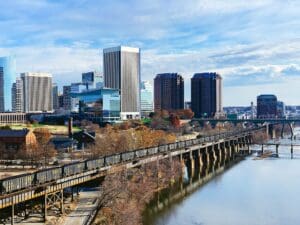By: JACQUI GERMAIN
Since the 2019 launch of Stockton, California’s, highly publicized universal basic income pilot, led by former mayor Michael Tubbs, guaranteed income pilot programs have multiplied across the country. Though both basic income programs and government-provided regular cash assistance have roots in the welfare rights movement of the 1960s, COVID-19 helped reignite interest. The pandemic jumpstarted a national conversation about the country’s underwhelming, restriction-heavy welfare system and broader lack of a social safety net. A growing number of public officials, lawmakers, and community organizations seem willing to give guaranteed income pilot programs a try.
Some pilots are backed by mayors and designed to extend support across a specific city or county. Many are backed by nonprofits, funded through private donations, and targeted towards specific demographic groups like new mothers, single fathers, or formerly incarcerated people. Others are some combination of all of the above.
Teen Vogue spoke to a few young participants of guaranteed income pilot programs around the country about their experience receiving consistent no-strings-attached cash payments.
Symphony Lee, 23, New Orleans
Program details: Symphony is in her third month of a guaranteed income pilot based in New Orleans, Louisiana. It provides unrestricted cash payments to young people between 16 and 24 years old who’ve graduated from high school but haven’t found steady employment and aren’t pursuing higher education. Recipients get $350 per month for a total of 10 months. The pilot’s latest cohort includes 125 young people.
“[It’s a] really big help for me because I am a mother of two kids, and I use that money to basically get all of their necessities for the month. So that’s really a big help [with] me being a single mother… I feel like, in a year, I’ll be in a more stable place when it comes to my finances [and] my home, because the $350 is in my spending habits… It’s very important because I’m also a school student. And so, [when] gas prices get high, the $350 — I use a proportion of that towards my gas money to get back and forth from school…
[Guaranteed income programs are] actually helping people.
It’s actually helping people get on their feet. It’s good to have some type of income that you can use, you know, for anything. Like, I’m just basically getting a free $350 to use towards anything that I need… I’m [also] gonna use the money toward more school supplies for my cosmetology journey — more clips and stuff like that.”
Chanel Adjei, 25, San Francisco
Program details: Chanel has been part of the Abundance Birth Project’s guaranteed income program for around seven months. It provides unrestricted cash payments to Black and Pacific Islander pregnant women and birthing people in their first or second trimester who also have a household income of less than $100,000 per year. Recipients get $1,000 per month for the duration of their pregnancy and for six months after the baby is born.
“Being a part of this program was so impactful for me because it gave me this feeling, like we’re gonna be okay. We got this… The security and the release came in knowing, for me, that the income I had I would be able to just put toward bills and catch up on bills. And personally, this extra relief came from knowing that I could use [the cash payments] as a security blanket for us… Thinking about not having this program, [it] would’ve been terrible because I would’ve been working really hard overtime. [I] probably would’ve picked up another job to try to create that security blanket before [my son] got here… So, I would’ve been pregnant putting tons of stress on my body, trying to just basically cram as much money as I could in savings as possible. I probably wouldn’t have been taking care of myself the way I needed to. And it would’ve probably been miserable…
Everyone thinks this is the land of milk and honey — it’s not that simple. It’s a struggle for a lot of people, and this could make all the difference in someone’s life… There’s so many people in society that kind of get cast away and are slowly fall through the [cracks] and keep getting lost and lost in the system. An income program like this can allow you to kind of get your footing back. Because for me, that’s what it did.”
Nicole Floran, 24, New York City
Program details: Nicole has been part of the Bridge Project’s guaranteed income program for one year. It provides unrestricted cash payments to low-income pregnant mothers and new mothers for three years. Recipients get $1,000 per month for the first 18 months and $500 per month for the last 18 months of the program. The pilot’s latest cohort includes 500 participants.
“Since COVID came, working at H&M hasn’t been the best. My hours haven’t been good. And since I was just coming back from a maternity leave [after] having a new baby, it hasn’t been as easy to be at work because I don’t have a babysitter for the days all the time. But now that my daughter is one, I’ve been able to get a little more help with being able to go to work. But if I did not have the Bridge Project to help me, I don’t know. I wanna say I would’ve been able to get my apartment because I have been saving up for it, but I don’t think I would have been able to fully be where I want to be right now.”
Daisy Aguilar, 21, Los Angeles
Program details: Daisy’s mother has been participating in the Basic Income Guaranteed: Los Angeles Economic Assistance Program (BIG:LEAP) for several months. The pilot program provides unrestricted cash payments to recipients who are either pregnant or have at least one dependent child and have an income level below the federal poverty level. Recipients get $1,000 per month for one year. The pilot’s latest cohort includes 3,200 participants.
“[My mom] was able to buy clothes for my siblings because they’re outgrowing [their clothes] so fast, since they’re children and they just outgrow their stuff so fast, you know? So, I think that helped her out a lot. And she was able to buy us food when we needed to. It’s just been a stress reliever for her because she’s always stressing about debts and stuff that she has to pay… If you come from a low-income family like us, I think it would really be helpful to have those extra funds to buy necessities, [or if] there’s something you might need to pay off. It would just be a stress reliever or just a [means of] savings, maybe — but mostly to be able to survive on it… I’ve [also] been able to continue school… Any opportunity like that comes across, it can help me out to continue school and provide for my necessities with the things that I might need as a student, like books or clothes.”
Kelldrin Hall, 16, Providence
Program details: Kelldrin’s mother has been participating in the Providence Guaranteed Income (PVDGI) pilot program for more than nine months. It provides unrestricted cash payments to households with an income at or below twice the federal poverty level. Recipients get $500 per month for one year. The pilot’s current cohort includes 110 participants.
“A lot of people had signed up for it or been in the lottery for it, and [my mom] was like, ‘Out of 100 people [picked], I was one of the people.’ She was very surprised and very grateful… It has been a stress reliever. She’s been happy. She’s always happy, but you know, sometimes when you don’t have everything you want or you need, you’re not happy. But the extra money makes her happy… When it comes to having a really limited income, you pass on the things you need versus some of the things you want. So, maybe if you had an extra $500 dollars, you could get the things you want now.”
Veronica Vieyra, 26, Santa Clara County, California
Program details: Veronica is in her second year of participating in a pilot program that provides unrestricted cash payments to former foster youth who’ve aged out of the county’s government services. Recipients get $1,000 per month along with financial mentoring for at least one year. There is presently a bill being considered in California’s legislature to expand the program to provide $1,000 monthly payments to 2,500 former foster youth for up to three years.
“Being in foster care, you always have a lot of people to depend on. You have social workers, you have case managers, all of that — and they’re always willing to do stuff for you. [But] once you exit the program, it’s all on you. You have maybe 10 people that are there helping you out, and once you exit, you end up with no one — it’s just you. You’re kind of like, what am I gonna do now? Being in foster care makes it harder because a lot of us don’t really have families or anyone to rely on, but I feel like this program makes you feel like, we got you, you know? And even my financial mentor — he was always there checking on me… It helped me so much because thanks to him, he helped me to not only be able to pay my rent, but also to save some money to have food and to pay the rest of my bills. I feel like the program really did a good job having financial mentors because they were not just there to help financially, but also emotionally.





















